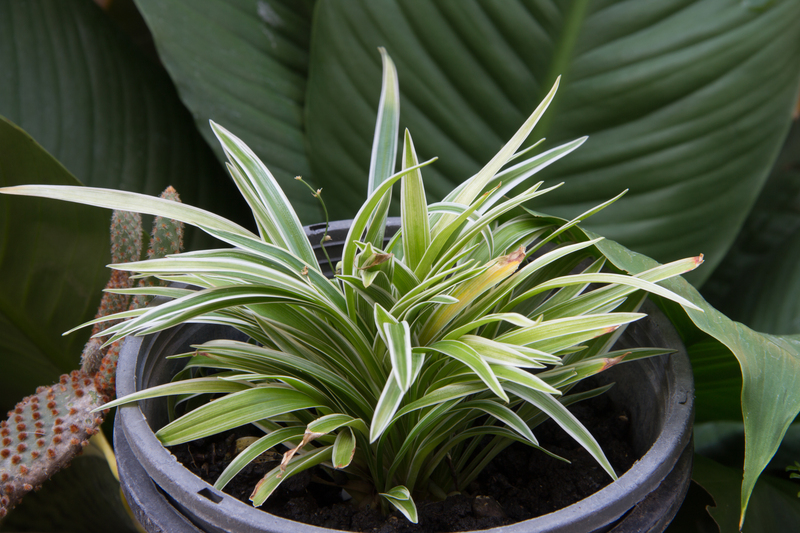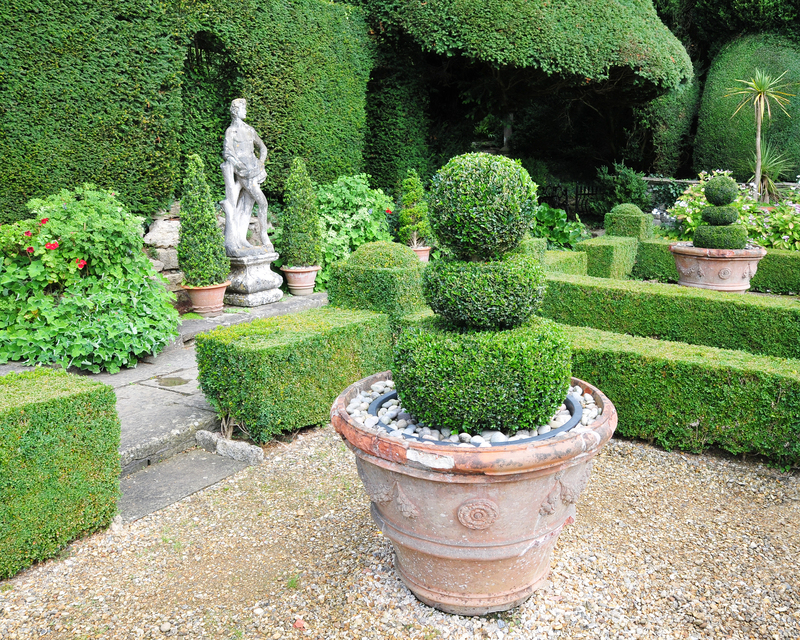Transform Your Space With Meaningful Zen Garden Plant Choices
Posted on 06/10/2025
Transform Your Space With Meaningful Zen Garden Plant Choices
Creating a Zen garden is not just about landscaping--it's about fostering a serene environment that embodies simplicity, tranquility, and a deeper connection to nature. Choosing the right plants is vital in transforming your space into an oasis of calm and beauty. This comprehensive guide will help you discover how to select meaningful Zen garden plant choices that will not only beautify your space but also bring a sense of balance and mindfulness to your daily life.
The Philosophy of Zen Gardens
Zen gardens, also known as Japanese rock gardens or Karesansui, are deeply rooted in Zen Buddhism. Their design principles focus on minimalism, symbolism, and the careful arrangement of natural elements such as rocks, gravel, and, importantly, plants. Every element has a purpose, often symbolizing aspects of the natural world--mountains, rivers, islands, and forests. Understanding the meaning behind plant choices can elevate your garden from simply beautiful to truly transformative.
Why Choose Plants for Your Zen Garden?
- Aesthetics: Plants soften the hard lines of rocks and gravel, creating visual harmony.
- Symbolism: Each plant carries cultural, spiritual, or natural significance.
- Seasonal Interest: Carefully chosen plants can provide beauty all year round.
- Mindful Maintenance: Tending your Zen garden can become a meditative practice.

Key Principles in Selecting Zen Garden Plants
Before diving into specific species, it's essential to understand the tenets that guide plant selection in Japanese-inspired landscaping:
- Less is more: Focus on simplicity by limiting your palette to a few meaningful species.
- Harmony: Plants should blend naturally with rocks, water features, and overall design.
- Evergreen preference: Many Zen gardens center around evergreens for year-round interest.
- Low maintenance: Select plants suited to your climate to minimize care requirements.
- Symbolism and meaning: Choose species with significance to deepen the garden's impact.
Top Meaningful Zen Garden Plant Choices
Let's explore some of the most powerful and meaningful Zen garden plants you can introduce to transform your space.
1. Japanese Maple (Acer palmatum)
The Japanese maple is a quintessential choice for any Zen-inspired garden. With its delicate, hand-shaped leaves and stunning seasonal color changes, this plant symbolizes peace, beauty, and balance.
- Features: Slow-growing, diverse foliage colors, adaptable to containers.
- Symbolism: Grace, serenity, impermanence of life (due to changing foliage).
- Ideal Placement: As a focal point, near water features, or in contemplative corners.
2. Bamboo (Phyllostachys spp. & Fargesia spp.)
Bamboo is revered in Zen culture for its resilience and flexibility. It brings vertical movement, a soft rustling sound, and creates privacy--all within a minimalist palette.
- Features: Fast-growing, evergreen, available in clumping and running varieties.
- Symbolism: Strength, flexibility, longevity, purification.
- Use Cases: Creating screens, edging paths, or as a backdrop for stones and lanterns.
3. Japanese Black Pine (Pinus thunbergii)
Prized for its unique silhouette, rugged texture, and evergreen needles, the Japanese black pine is frequently pruned into fascinating shapes. It's iconic in many traditional Japanese gardens.
- Features: Salt-tolerant, drought-resistant, long-living.
- Symbolism: Endurance, immortality, spiritual fortitude.
- Cultural Context: Often found near temples and in coastal Zen gardens.
4. Moss (Bryophyta species)
Moss embodies the wabi-sabi philosophy: finding beauty in imperfection and transience. It softens hard edges, covers stones, and brings a sense of ancient tranquility to any garden.
- Features: Requires shade and moisture, minimal height, deep green color.
- Symbolism: Humility, age, and the passage of time.
- Installation Tips: Best for shady spots; can be encouraged with buttermilk or yogurt culture on stones.
5. Ferns (Various genera)
Ferns like Dryopteris and Athyrium offer lacy fronds that evoke woodland calmness and fill gaps with lush greenery.
- Features: Prefer shade, excellent groundcover, adaptable.
- Symbolism: New beginnings, family, sincerity.
- Best Use: Undergrowth, between rocks, and along winding paths.
6. Azaleas and Camellias (Rhododendron & Camellia spp.)
These blooming shrubs bring seasonal bursts of color to Zen gardens, with azaleas noted for spring blooms and camellias for late winter flowers.
- Features: Varied growth habits, acid-loving, vibrant flowers.
- Symbolism: Passion, welcome, fragile beauty.
- Placement: As accent specimens or in drifts beneath trees.
7. Japanese Forest Grass (Hakonechloa macra)
This graceful grass adds movement and luminous color, especially the popular 'Aureola' variety with its golden-striped blades.
- Features: Grows in shade, cascading effect, striking in mass plantings.
- Symbolism: Softness, adaptability, prosperity.
- Use: Under trees, beside paths, or as groundcover near water features.
Tips for Designing with Zen Garden Plants
1. Start With Structure
Use evergreens like pines and bamboo to establish the skeleton of your Zen garden. These provide year-round interest and a calm green backdrop against which other plants can shine.
2. Layer for Depth and Texture
Arrange plants by height, leaf size, and color to create depth. Combine tall pines with mid-sized maples and low moss or ferns for a harmonious effect.
3. Embrace Empty Space
In true Zen style, avoid overcrowding. Strategic placement of plants interspersed with gravel, stone, or sand patterns creates visual "breathing space" and enhances contemplation.
4. Highlight Seasonal Changes
Include plants that offer year-round beauty--spring azalea blooms, vibrant maple foliage in autumn, mossy carpets in winter. This celebrates the passage of time and invites mindfulness.
5. Integrate Symbolism
Choose plant species with personal or cultural significance to enhance the garden's spiritual resonance. For instance, consider adding cherry blossoms (Prunus serrulata) for themes of renewal.
Other Plant Considerations for Your Zen Garden
Bonsai: Miniature Worlds of Meaning
Though not exclusive to Zen gardens, bonsai can be a spectacular addition as a living art form. They symbolize patience, discipline, and reverence for nature's miniature expressions.
Groundcovers and Accents
- Japanese Spurge (Pachysandra terminalis): Forms dense, low mats of green, ideal for shaded areas.
- Liriope: Offers grassy tufts and lavender flower spikes.
- Sedum: Good for sunny rock gardens, easy-care and drought-tolerant.
Water Plants
If your Zen garden includes a pond or water basin, consider lotus (Nelumbo nucifera) or water lilies for their symbolic associations with purity, enlightenment, and rebirth.
Common Mistakes to Avoid
- Overplanting: Too many species can create visual clutter and dilute the garden's intention.
- Ignoring site conditions: Always select plants suited to your region's light, soil, and climate for low-maintenance beauty.
- Forgetfulness of symbolism: Integrate plants with purpose, not just for looks, to achieve a truly meaningful Zen garden.
Maintaining Your Zen Sanctuary
Tending a Zen garden is a meditative act. Regular pruning, weeding, and raking keeps the space tidy and allows you to sync with the garden's rhythms. As you water moss, trim a maple, or rake gravel into patterns, you practice presence and mindfulness.
Bringing Zen Inside: Indoor Zen Garden Plants
Don't have an outdoor space? You can transform your indoor environment with meaningful Zen plant choices like dwarf bamboo, bonsai, ferns, and small potted evergreens. Place near windows, use shallow containers with pebbles, and accent with minimalist decor for the serene effect.

Zen Gardens Beyond Plants: Completing the Experience
While plants are essential, remember that Zen gardens are also about rocks, gravel, water, and thoughtful ornamentation--such as stone lanterns or bridges. Integrating these elements with your planted selections is key to achieving a harmonious and holistic retreat.
Conclusion: Cultivating Peace Through Plant Choices
Transforming your space with meaningful Zen garden plant choices is about more than aesthetics--it's a journey toward a deeper connection with nature and yourself. By selecting plants with significance, arranging them thoughtfully, and maintaining them with care, you create not just a garden, but a sanctuary for reflection, presence, and peace. Whether revitalizing a backyard or greening a small balcony, your Zen oasis begins with meaningful plant choices that reflect your intentions and values.
Ready to embark on your Zen garden transformation? Start by selecting plants that resonate with your vision, honor the space's natural rhythm, and invite tranquility into every corner of your life.
Latest Posts
Must-Try Planting Concepts for a Beautiful Autumn Garden
DIY Guide to Perfectly Sharpening Garden Shears at Home
Essential Techniques for Maintaining Clean and Lush Artificial Grass
Transform Your Space With Meaningful Zen Garden Plant Choices




